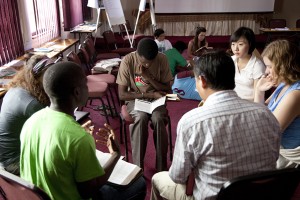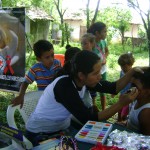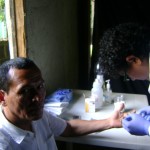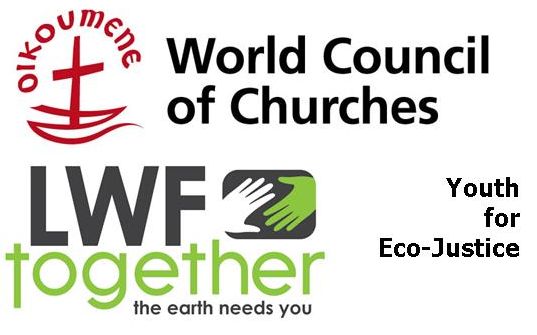The Nicaraguan Lutheran Church of Faith and Hope(ILFE) held the first fair of HIV in the community of “El Bonete”, the municipality of Villanueva, in the department of Chinandega, a region that has the highest rates of HIV in Nicaragua.
The activity began with a video forum, on Friday, the first of July, which simply reflects the reality of HIV in rural areas, based on experiences and real situations. For lack of information in rural areas, HIV is something like from another universe, something that only can be concerned to homosexuals, sex workers or often they simply ignore the subject. Through the video participants could see a reality reflected in the context of their identify such as machism, migration, poverty, stigma, which are factors that make them vulnerable to disease. The video also show how some churches and its vision about the subject in the rural areas often becomes an obstacle because the disease is seen as a punishment from God, what makes very difficult for the Lutheran Church to convince the people of their comunities that’s it’s very important to inform about prevention and show a God of love.
On Saturday, the second of July, ILFE in collaboration with CISAS, the Health Center of “El Bonete”, offered to the people of the community making free HIV tests. Some youth from the church are certified to provide the counseling pre test and post test in wich they give some explanations about the basic concepts, the function and the expiration of the test before taking the blood sample. They gave clear and accurate information about HIV, while waiting on the result.
Delsis Lainez, 20, a young leader of the Lutheran Church’s community “El Bonete”, told us that during the week he was trying to promote the activity. They went from house to house to invite the people to participate in the program and the free HIV test, he hang up posters with information on HIV and went to the radio.
“This activity seems wonderful, we have never done anything like this before in the community. People don’t know yet anything about the subject, that’s why I think the contribution of the Church is great, especially for women and youth”, said Delsis.
The medical students of the Church realized a total of 55 tests, mostly young women and housewives. This latter group claimed that they were sent by their husbands to get tested because “if they went negative,” they also were. In a community like “El Bonete”, where there is a lot of stigma and fear of getting tested, the majority of the people is thinking that the disease is far away from themself. But they do not take into account that many times men are partakers of irresponsible sexual practices with multiple partners without using protection.
While the mothers got tested, the children enjoyed games, piñatas in charge of the youth ministry of the Church who also painted the faces of the children with fun designs.
During the fair they delivered materials and brochures containing information about the virus and the health center of “El Bonete” gave condoms to the participants.
There was also a performance of a soccer league in order to attract young people and inform them about the activity and encourage them to get tested.
Because in rural areas young people begin to have work responsibilities and families from an early age on, for example a lot of girls get married at the age of 15.
At the end of the two days Taira Paola Baenz, one of the community leaders, confirmed that she was very happy about the activity. He told that for the community it was a very important day because many people are unaware of the issue and this somehow awakens them. “Knowledge and information and most importantly, the test was being offered free of charge! So hopefully a lot of people today realized the importance of the sexual education”.
 By Roger Schmidt, Secretary for LWF Youth
By Roger Schmidt, Secretary for LWF Youth



